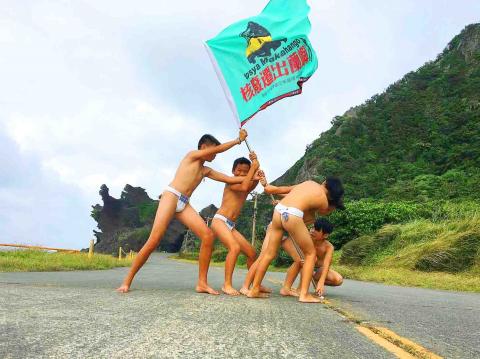Young Aborigines on Orchid Island (Lanyu, 蘭嶼) yesterday protested for a clear deadline for the removal of nuclear waste from the island.
Raising flags on the island, the campaigners said they would not accept an apology from the government and would not accept further delays for removal of the waste material.
The Orchid Island Youth Movement Alliance, which organized the protest, said that since President Tsai Ing-wen’s (蔡英文) apology last year to Aborigines for historical injustices, no action has yet been taken on the issue of nuclear waste on Orchid Island — where more than 90 percent of residents are Tao.

Photo courtesy of Yen Tzu-yu
The Lanyu nuclear waste storage facility was built in 1982 and stopped processing nuclear waste in 1996.
In February, the government reiterated its promise to relocate waste on the island and panned several potential sites including uninhabited islands near Keelung, as well as Kinmen, Penghu and Matsu counties.
Chanting slogans outside the waste facility, campaigners demanded that the government take concrete action and clarify a timetable for when waste relocation would be completed.
“We are not interested in empty promises or in talking things over,” one campaigner said.
Another said they are concerned that the issue is being overlooked by society and that they hoped to draw people’s attention to the issue.
“We demand that the government deal with this issue immediately,” they said.
The alliance said the storage of the waste on the island constitutes an illegal act by Taiwan Power Co.
The company had leased the space for waste storage, but that lease expired in 2014, the alliance said, adding that the township would not continue the lease.
Many of the island’s residents participated in yesterday’s protest, with others hanging banners on their doors in support.

SHIPS, TRAINS AND AUTOMOBILES: The ministry has announced changes to varied transportation industries taking effect soon, with a number of effects for passengers Beginning next month, the post office is canceling signature upon delivery and written inquiry services for international registered small packets in accordance with the new policy of the Universal Postal Union, the Ministry of Transportation and Communications said yesterday. The new policy does not apply to packets that are to be delivered to China, the ministry said. Senders of international registered small packets would receive a NT$10 rebate on postage if the packets are sent from Jan. 1 to March 31, it added. The ministry said that three other policies are also scheduled to take effect next month. International cruise ship operators

HORROR STORIES: One victim recounted not realizing they had been stabbed and seeing people bleeding, while another recalled breaking down in tears after fleeing A man on Friday died after he tried to fight the knife-wielding suspect who went on a stabbing spree near two of Taipei’s busiest metro stations, Taipei Mayor Chiang Wan-an (蔣萬安) said. The 57-year-old man, identified by his family name, Yu (余), encountered the suspect at Exit M7 of Taipei Main Station and immediately tried to stop him, but was fatally wounded and later died, Chiang said, calling the incident “heartbreaking.” Yu’s family would receive at least NT$5 million (US$158,584) in compensation through the Taipei Rapid Transit Corp’s (TRTC) insurance coverage, he said after convening an emergency security response meeting yesterday morning. National

PLANNED: The suspect visited the crime scene before the killings, seeking information on how to access the roof, and had extensively researched a 2014 stabbing incident The suspect in a stabbing attack that killed three people and injured 11 in Taipei on Friday had planned the assault and set fires at other locations earlier in the day, law enforcement officials said yesterday. National Police Agency (NPA) Director-General Chang Jung-hsin (張榮興) said the suspect, a 27-year-old man named Chang Wen (張文), began the attacks at 3:40pm, first setting off smoke bombs on a road, damaging cars and motorbikes. Earlier, Chang Wen set fire to a rental room where he was staying on Gongyuan Road in Zhongzheng District (中正), Chang Jung-hsin said. The suspect later threw smoke grenades near two exits

The Forestry and Nature Conservation Agency yesterday launched a gift box to market honey “certified by a Formosan black bear” in appreciation of a beekeeper’s amicable interaction with a honey-thieving bear. Beekeeper Chih Ming-chen (池明鎮) in January inspected his bee farm in Hualien County’s Jhuosi Township (卓溪) and found that more than 20 beehives had been destroyed and many hives were eaten, with bear droppings and paw prints near the destroyed hives, the agency said. Chih returned to the farm to move the remaining beehives away that evening when he encountered a Formosan black bear only 20m away, the agency said. The bear